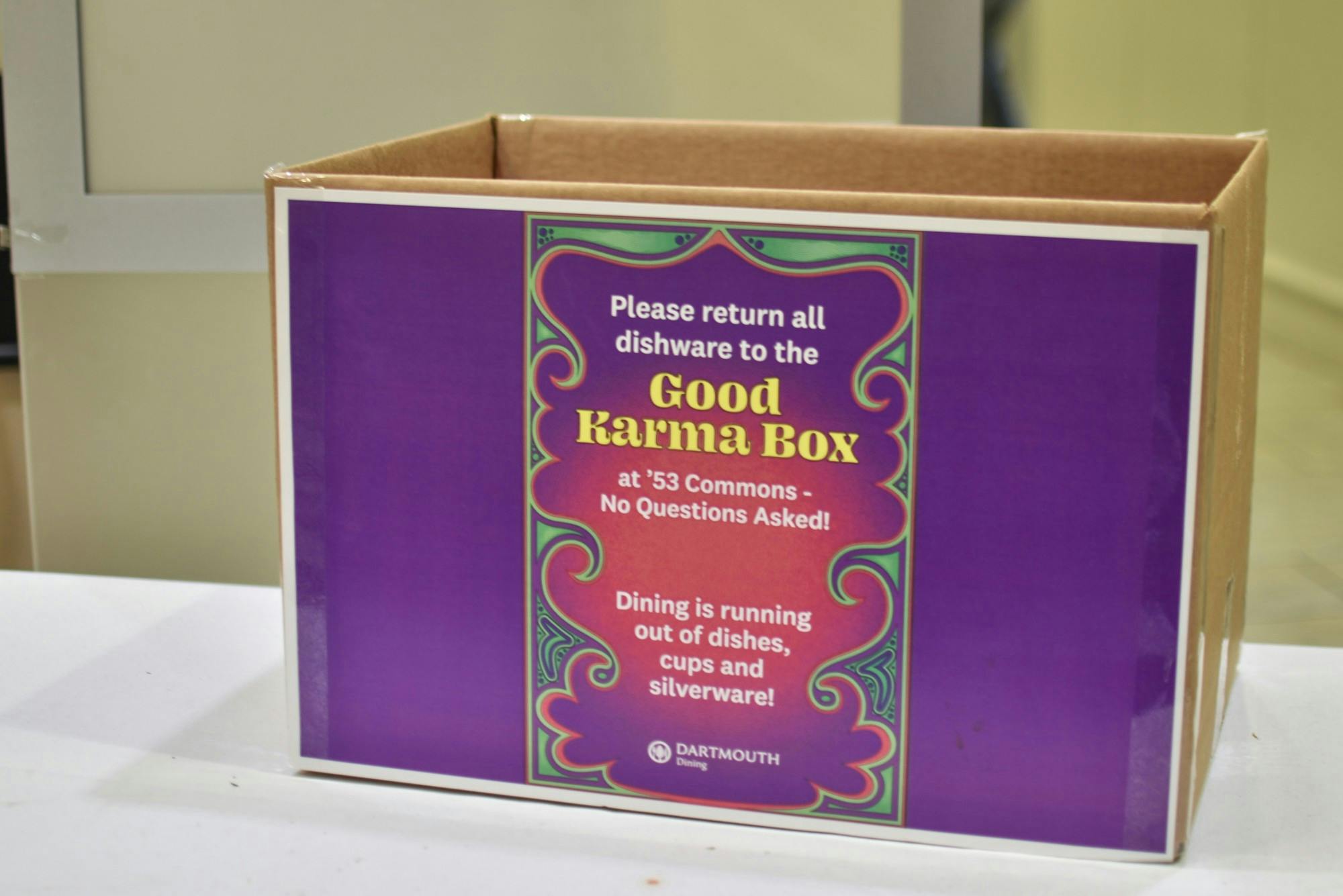While the theft of green coffee mugs from the Class of 1953 Commons is “not a new phenomenon,” supply chain shortages have presented new challenges for replacing the stolen mugs, according to Dartmouth Dining Services director Jon Plodzik. Novack Cafe has also seen increased theft this term, with students stealing items from the concession stand and refrigerator to avoid long lines at the register, according to Novack supervisor Manuel Rodriguez ’23.
In response to the estimated 750 missing mugs this year, Plodzik said that DDS is finding new ways to account for stolen kitchenware items. For instance, “Good Karma” boxes have sprouted up around campus for students to return “borrowed” items without fear of punitive measures. The idea first came to Plodzik one day after joking with some students that “it would be good karma if [students] brought stuff back.” Plodzik said that “slowly, slowly, [the Karma Boxes have] been somewhat successful” — though, ironically, the first box was stolen.
Rodriguez, who has worked at Novack since his freshman fall, has never formally heard of a policy regarding student theft. However, he said it is implicitly understood that if someone is walking away from the register without paying first, workers should call out “Hey, do you want a swipe or DBA?” This way, the student has the opportunity to pay for their items without DDS “embarrassing them” but still “keeping them accountable,” he added.
’53 Commons general manager Brandon Crosby said he also tends to accomodate students.
“We do know that, occasionally, this time of year does [present] tons of people [who] are joining fraternities and sororities, and if you need something as part of a pledge or whatnot, you should let us know, [and] we will help,” Crosby said. “We would rather help you be successful than to put you in a situation where you feel like you need to take something from us.”
According to Plodzik, the green coffee mugs, which are custom made for Dartmouth, cost DDS $11 each. Due to supply shortages, DDS has since ordered a “cheaper” brand of white coffee mugs that are six dollars each.
“I want a good quality experience for [the students], and these pieces make the difference really, to be honest with you,” Plodzik said. “You can have a nice piece of meat fillet on a paper plate, or you can have it on a china plate, and I guarantee you’ll [have] a better meal when you eat off china than you do on paper.”
Rodriguez observed that the normal class schedule — with 15 minutes between classes — paired with long lines has also encouraged students to steal.
Rodriguez said that people are often desperate to get “any form of snack” before their class, but can’t afford to be late due to the wait time, so are left to take their items and leave without paying.
At the height of the pandemic, DDS transitioned to fully to-go meals to reduce the spread of COVID-19. Many students took metal cutlery instead of plastic utensils, which they then never returned, according to Crosby.
Much like the rest of the country, DDS has also been impacted by supply chain shortages, meaning that “the problem is [DDS] can no longer replace those items in a timely fashion,” Plodzik said.
At Novack, workers are “swamped with orders,” making it difficult to assist students in a rush, Rodriguez said. According to Rodriguez, students will request to pay at the outside register at Novack to avoid the wait time at the main register. However, due to limited staff, Rodriguez said he has been forced to ask students to step into the main line. He said he will watch them “walk in that direction but then never see them again at the front register.”
DDS has faced labor shortage issues and supply chain issues due to the pandemic. To address the labor shortage, DDS has advertised on a number of local radio stations along with the Valley News, according to Plodzik.
“The College has been very proactive at instituting things like retention bonuses for people who work in the evenings, adjusting shift differentials for people who work at night and on the weekends,” Plodzik said. “The main challenge is that the pool of applicants is just not very deep.”
“We are struggling on some of the fundamentals that we need to have to keep this business operating,” Plodzik said.

Arizbeth Rojas ’25 is a managing editor of the 181st directorate from Dallas, TX. When she’s not listening to DJ Sabrina the Teenage DJ or planning her next half marathon, you can find her munching on a lox bagel.




